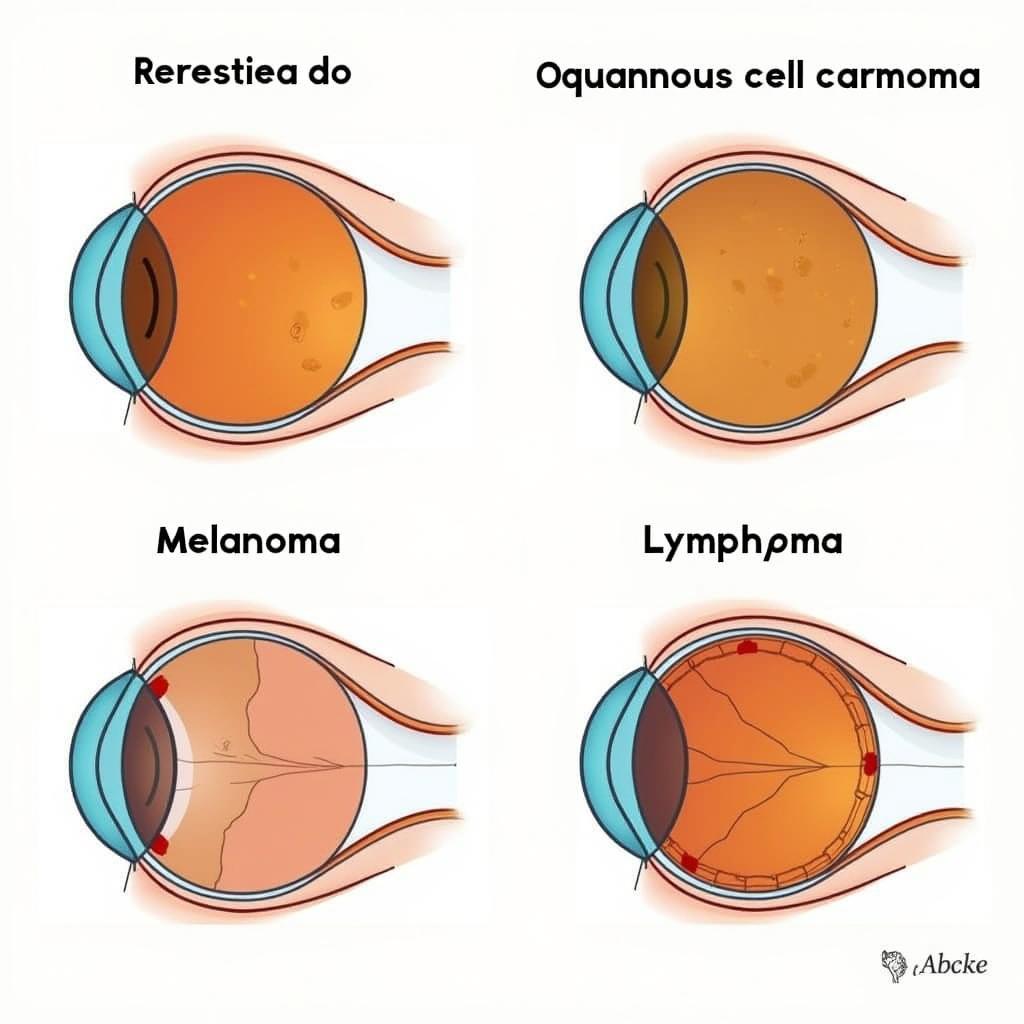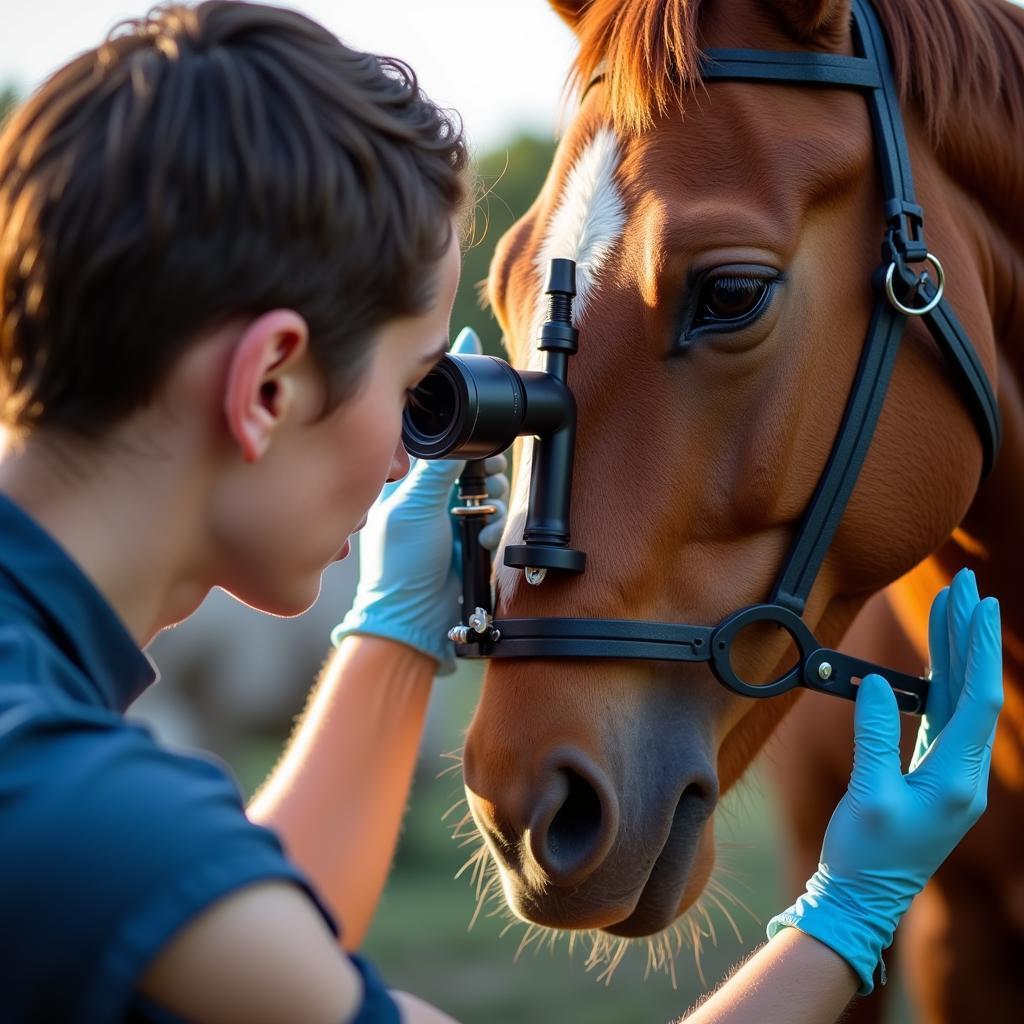Eye cancer in horses is a serious condition that can lead to blindness and even death if left untreated. While not as common as other equine health concerns, understanding the signs, symptoms, and available treatments is crucial for any horse owner. This article delves into eye cancer in horses, providing valuable insights based on visual cues.
What Does Eye Cancer in Horses Look Like?
Early detection is key when it comes to treating eye cancer in horses. Unfortunately, many horses don’t show obvious symptoms in the early stages, making visual examination critical. Here are some common signs to watch out for:
- Changes in Eye Appearance: One of the first things you might notice is a change in the appearance of your horse’s eye. This could include:
- Cloudiness: Instead of a clear, bright eye, you might see a hazy or cloudy film over the surface.
- Color Changes: The color of the iris might change, or you might see redness or inflammation in the white part of the eye (sclera).
- Masses or Growths: A tumor might appear as a visible mass or bump on the eyelid, the conjunctiva (the pink tissue lining the eyelid), or even on the surface of the eye itself.
 Different Types of Eye Cancer in Horses
Different Types of Eye Cancer in Horses
- Abnormal Discharge: Excessive tearing or discharge from the eye can be a sign of various eye problems, including cancer. The discharge might be watery, thick, or even bloody.
- Changes in Behavior: Horses with eye cancer might show behavioral changes related to vision impairment. This could include:
- Reluctance to go into bright light: Horses with eye pain or vision problems might be hesitant to move into well-lit areas.
- Clumsiness or bumping into things: Vision impairment can lead to clumsiness and difficulty navigating obstacles.
- Head shyness or rubbing the eye: Horses in discomfort might rub their eye on their legs or other objects to alleviate pain or irritation.
Types of Eye Cancer in Horses
There are several types of eye cancer that can affect horses, each with its own characteristics:
- Squamous Cell Carcinoma: This is the most common type of eye cancer in horses. It often appears as a pink, fleshy growth on the eyelid, third eyelid, or conjunctiva.
- Melanoma: Melanomas are tumors that arise from pigment-producing cells called melanocytes. They can appear as dark, pigmented masses and are more common in horses with dark-colored skin.
- Lymphoma: Lymphoma is a cancer of the lymphatic system. It can affect various parts of the body, including the eye. In the eye, lymphoma might appear as swelling around the eye or within the eye itself.
 Veterinarian Examining a Horse's Eye
Veterinarian Examining a Horse's Eye
Diagnosis and Treatment of Eye Cancer in Horses
If you notice any of the signs mentioned above, it’s essential to contact your veterinarian immediately. They will perform a thorough eye exam and may recommend additional tests, such as:
- Biopsy: A biopsy involves taking a small tissue sample from the suspicious area and examining it under a microscope to confirm the diagnosis of cancer.
- Ultrasound: An ultrasound can help determine the size and location of the tumor and whether it has spread to surrounding tissues.
- X-rays: X-rays of the skull can help rule out other conditions and check for any bone involvement.
Treatment for eye cancer in horses depends on the type of cancer, the location and size of the tumor, and the overall health of the horse. Options might include:
- Surgery: In some cases, surgery can be performed to remove the tumor. This is more likely to be successful if the tumor is small and localized.
- Radiation Therapy: Radiation therapy uses high-energy rays to kill cancer cells. It can be used alone or in combination with surgery.
- Chemotherapy: Chemotherapy uses drugs to kill cancer cells. It’s typically used for cancers that have spread beyond the eye.
Conclusion
Early detection is vital when it comes to eye cancer in horses. Familiarizing yourself with the common signs and seeking prompt veterinary attention can significantly improve the chances of successful treatment and management of this serious condition. If you suspect your horse may have eye cancer, don’t delay in seeking professional help.
For immediate assistance, please contact us at Phone Number: 0772127271, Email: [email protected] Or visit us at: QGM2+WX2, Vị Trung, Vị Thuỷ, Hậu Giang, Vietnam. Our dedicated customer care team is available 24/7 to address your concerns and provide expert guidance.